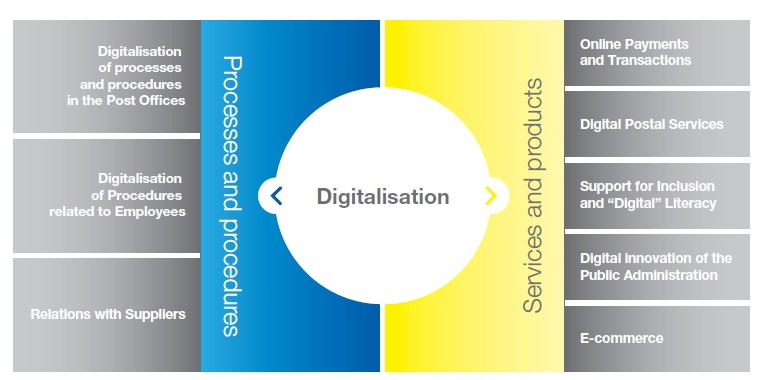For us, helping the environment means more than just reducing the company’s impact. It also means our actions must be informed by the awareness of the close relationship between the environment and society. Contributing to an Italian green economy calls for an integrated approach on our part.
For this reason, Poste Italiane’s green strategy has two goals: protecting the environment, starting with climate change, and promoting social inclusion. The strategy has three pillars:
We have picked two priority areas for our dematerialization strategy: on one hand, the processes and procedures through which we manage relationships with employees and suppliers; on the other, products and services for our customers.

For this reason, Poste Italiane’s green strategy has two goals: protecting the environment, starting with climate change, and promoting social inclusion. The strategy has three pillars:
- dematerialisation: replacing paper documents with their digital equivalents – from service access to products – and innovating systems with an eye to streamlining logistics, reducing the transport of people and objects;
- Green Building: improving energy efficiency at over 13,700 buildings and 4 data centres;
- mobility management: management of the company’s car fleet and improvement in the staff’s home-office commutes.
REDUCING ENVIRONMENTAL IMPACT THROUGH DIGITALIZATION
We have picked two priority areas for our dematerialization strategy: on one hand, the processes and procedures through which we manage relationships with employees and suppliers; on the other, products and services for our customers.
The digitalisation process at the service of internal and external customers

A shift from paper files to electronic documents for human resources purposes has led to the creation of 128,000 digital files that we estimate can result in saving 2.5 tonnes of paper each year. Digitalisation of administrative processes for human resources will result in an estimated saving of 8.5 tonnes of paper annually.
We are working on extending dematerialisation to all new contracts and transactions, while at the same time increasing the number of post offices (78% of total) and financial consulting rooms (75%) equipped with our technological platform. Thanks to these efforts, in 2017 we achieved 38 million dematerialisations, of which over 7 million were for contracts (+107% from 2016).
RENEWABLE ENERGY AND SAVING ENERGY
Using renewable energy sources is important to reducing our environmental impact. At Group level, the main consumption of energy at our facilities and offices is attributable to electricity which accounts for 72% of total consumption, followed by methane gas consumption for heating at 23%, whereas the rest is due to diesel, LPG and remote heating consumption (5%). In 2017, 95.2% of the electricity was procured from renewable sources certified with Guarantees of Origin and a small portion, equal to 0.4%, self-produced from our own photovoltaic plants. Thanks to this choice, our electricity consumption generated only 8,000 tonnes of CO2.
We reduce waste by installing and activating energy consumption monitors in our most energy-hungry sites, which allow us to analyse our energy use and better regulate temperatures and schedules for heating and cooling.
Using renewable energy sources is important to reducing our environmental impact. At Group level, the main consumption of energy at our facilities and offices is attributable to electricity which accounts for 72% of total consumption, followed by methane gas consumption for heating at 23%, whereas the rest is due to diesel, LPG and remote heating consumption (5%). In 2017, 95.2% of the electricity was procured from renewable sources certified with Guarantees of Origin and a small portion, equal to 0.4%, self-produced from our own photovoltaic plants. Thanks to this choice, our electricity consumption generated only 8,000 tonnes of CO2.
We reduce waste by installing and activating energy consumption monitors in our most energy-hungry sites, which allow us to analyse our energy use and better regulate temperatures and schedules for heating and cooling.
LOGISTICS AND SUSTAINABLE MOBILITY
With 28,635 letter carriers who travel to all corners of the country, car fleet management is an important lever to reducing the Group’s environmental impact. Poste Italiane is rolling out a fleet of increasingly environmentally friendly vehicles, like hybrid and electric cars, and is streamlining logistics routes using latest-generation technologies and asking suppliers and external transport companies to respect basic environmental prerequisites.
Of the 38,690 vehicles in our fleet in 2017, 4,369 of them were powered by alternative energy sources, of which 1,064 were electric, 119 were hybrid and 3,192 ran on petrol/methane or petrol/GPL.
Moreover, Poste Italiane set up a Mobility Management programme in 2012 in order to improve our staff’s home-office commute, which calls for a greater use of public transport, car-pooling, alternative mobility options (bicycles), low environmental impact collective mobility and fine-tuning the entrances and parking areas at company offices.
The Mobility Management programme enabled us to cut C02 emission by 9,290 tonnes in 2017.
With 28,635 letter carriers who travel to all corners of the country, car fleet management is an important lever to reducing the Group’s environmental impact. Poste Italiane is rolling out a fleet of increasingly environmentally friendly vehicles, like hybrid and electric cars, and is streamlining logistics routes using latest-generation technologies and asking suppliers and external transport companies to respect basic environmental prerequisites.
Of the 38,690 vehicles in our fleet in 2017, 4,369 of them were powered by alternative energy sources, of which 1,064 were electric, 119 were hybrid and 3,192 ran on petrol/methane or petrol/GPL.
Moreover, Poste Italiane set up a Mobility Management programme in 2012 in order to improve our staff’s home-office commute, which calls for a greater use of public transport, car-pooling, alternative mobility options (bicycles), low environmental impact collective mobility and fine-tuning the entrances and parking areas at company offices.
The Mobility Management programme enabled us to cut C02 emission by 9,290 tonnes in 2017.


